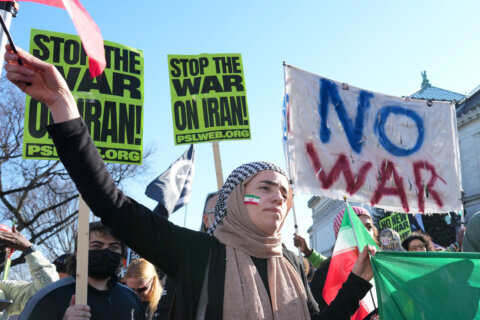The isolation of COVID-19 lockdowns brought about a nearly 30% increase in demand for mental health services throughout the country. But for LGBTQ youth, the isolation and anxiety from the last year has only exacerbated preexisting mental health battles.
In 2020, 42% of young LGBTQ people — including more than half of transgender or nonbinary youths — considered suicide, according to a survey conducted from October to December 2020 by The Trevor Project, a national organization that provides crisis and suicide prevention to LGBTQ youth.
Out of those surveyed, 70% said that their mental health was “poor” during the pandemic; 48% said they wanted counseling in the past year but couldn’t get it, and only a third said their home was LGBTQ-friendly.
Jorge Membreño, director of clinical services at SMYAL, a D.C.-based organization that supports LGBTQ youth, said the “collective trauma” of the pandemic has only added to the difficulties their clients already face.
“You’ve got youth who have been consistently marginalized and have existed with trauma,” he said. “To have a pandemic like this happen is only going to increase that feeling of isolation.”
Safe spaces stripped away
Membreño said that the pandemic stripped away many physical safe spaces for LGBTQ youth and diminished their ability to build a supportive community, create healthy coping strategies and practice an authentic way of life.
“Our youth at [the start of the pandemic] are now being physically isolated from their environments that they are finding safety,” he said.
Many of the LGBTQ college students SMYAL works with had to leave their living situations and return to unaccepting and unsafe households, forcing them into isolation in a family or other living situation that was “rejecting or toxic,” Membreño said.
Membreño said that some were able to leave their living environments through SMYAL’s housing program for 18- to 24-year-olds in the D.C. area. But many had to stay in unsupportive environments.
“For them to be able to exist and live within their own identity — that gets strongly limited if they are living in an environment that is rejecting. But then, you also can’t leave to go anywhere else to find support and community and identity.”
He added that SMYAL saw a huge uptick in substance abuse among young people in the program.
Coming out
Membreño said the pandemic also put a pause on the ability of young people who are transitioning to express their identities to the outside world.
During most of 2020, the halt in nonessential surgeries across the country led to the cancellation or rescheduling of gender-affirming surgeries, he said. And Columbia University’s Department of Psychology wrote that the closure of courts for nonessential services made it more difficult for transgender or nonbinary individuals to legally change their names or gender markers.
“If it was a situation where they had just come out, and they were just exploring their sexual identity or gender identity … [but] they are starting off with the deficit of no community around them, that’s going to be especially difficult,” Membreño said.
“Coming out is a journey,” he added. “And then if that journey gets stalled out, and [starts] to pivot outside of the expectations of what you had, of a celebration — it’s an incredibly poignant way to come out, in an isolated world where you have felt isolated.”
The loss — and risk — of work
Membreño said that SMYAL’s transgender women of color were the “absolute most affected” by the pandemic — specifically when it came to employment.
“If you start to remove pieces of the economy and pieces of employment, the ones who will be affected most are absolutely our trans women of color, who have been looking for employment and haven’t been successful in that pre- or post-COVID world. And then you’ve eliminated all opportunities,” he said. “Everyone’s in competition, so there’s almost no opportunity there.”
For some of SMYAL’s LGBTQ youth, their line of work became a health risk.
Membreño said that SMYAL creates safety plans for its youth that engage in sex work, so they can discuss violence and sexually transmitted infections. During the pandemic, that line of work became especially dangerous: Many LGBTQ sex workers were suddenly forced to choose between potentially contracting COVID-19 or giving up their main source of income.
He said that many of the youth SMYAL works with have started to find employment opportunities again as vaccinations rise. The organization traditionally works with LGBTQ youth in the DMV area, but during the pandemic it expanded nationally by offering many of its services virtually.
Membreño said that the organization is looking to launch mental health services in the future by hiring therapists and other clinicians.
Find out more about some of SMYAL’s virtual programs on its website.
- Sign up for WTOP alerts
- Latest coronavirus test results in DC, Maryland and Virginia
- Coronavirus vaccine FAQ: What you need to know
- Latest vaccination numbers in DC, Maryland and Virginia
Looking for more information? D.C., Maryland and Virginia are each releasing more data every day. Visit their official sites here: Virginia | Maryland | D.C.








